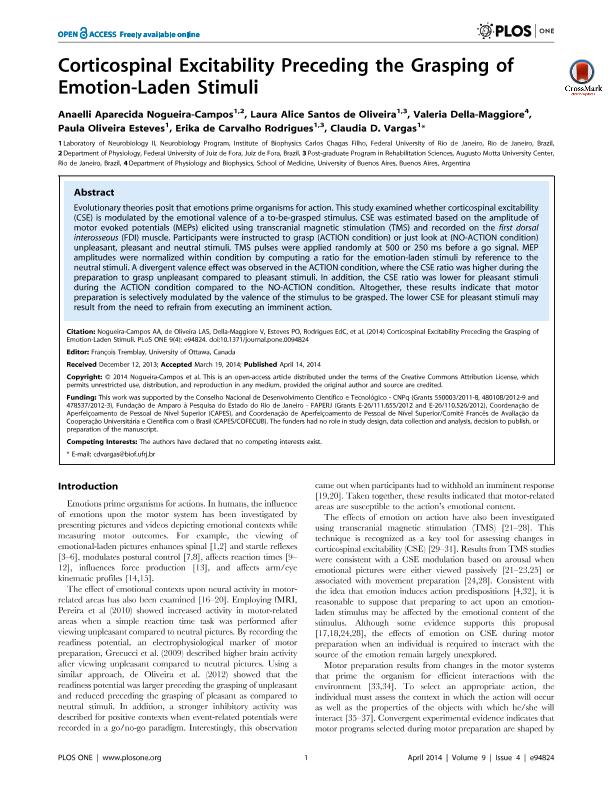Mostrar el registro sencillo del ítem
dc.contributor.author
Nogueira Campos, Anaelli Aparecida
dc.contributor.author
de Oliveira, Laura Alice Santos
dc.contributor.author
Della Maggiore, Valeria Monica

dc.contributor.author
Esteves, Paula Oliveira
dc.contributor.author
Rodrigues, Erika de Carvalho
dc.contributor.author
Vargas, Claudia D.
dc.date.available
2020-09-10T20:59:55Z
dc.date.issued
2014-04
dc.identifier.citation
Nogueira Campos, Anaelli Aparecida; de Oliveira, Laura Alice Santos; Della Maggiore, Valeria Monica; Esteves, Paula Oliveira; Rodrigues, Erika de Carvalho; et al.; Corticospinal Excitability Preceding the Grasping of Emotion-Laden Stimuli; Public Library of Science; Plos One; 9; 4; 4-2014; 1-7; e94824
dc.identifier.issn
1932-6203
dc.identifier.uri
http://hdl.handle.net/11336/113753
dc.description.abstract
Evolutionary theories posit that emotions prime organisms for action. This study examined whether corticospinal excitability (CSE) is modulated by the emotional valence of a to-be-grasped stimulus. CSE was estimated based on the amplitude of motor evoked potentials (MEPs) elicited using transcranial magnetic stimulation (TMS) and recorded on the first dorsal interosseous (FDI) muscle. Participants were instructed to grasp (ACTION condition) or just look at (NO-ACTION condition) unpleasant, pleasant and neutral stimuli. TMS pulses were applied randomly at 500 or 250 ms before a go signal. MEP amplitudes were normalized within condition by computing a ratio for the emotion-laden stimuli by reference to the neutral stimuli. A divergent valence effect was observed in the ACTION condition, where the CSE ratio was higher during the preparation to grasp unpleasant compared to pleasant stimuli. In addition, the CSE ratio was lower for pleasant stimuli during the ACTION condition compared to the NO-ACTION condition. Altogether, these results indicate that motor preparation is selectively modulated by the valence of the stimulus to be grasped. The lower CSE for pleasant stimuli may result from the need to refrain from executing an imminent action.
dc.format
application/pdf
dc.language.iso
eng
dc.publisher
Public Library of Science

dc.rights
info:eu-repo/semantics/openAccess
dc.rights.uri
https://creativecommons.org/licenses/by-nc-sa/2.5/ar/
dc.subject
Corticospinal excitability
dc.subject
Emotion
dc.subject
Motor preparation
dc.subject
Modulation
dc.subject.classification
Neurociencias

dc.subject.classification
Medicina Básica

dc.subject.classification
CIENCIAS MÉDICAS Y DE LA SALUD

dc.title
Corticospinal Excitability Preceding the Grasping of Emotion-Laden Stimuli
dc.type
info:eu-repo/semantics/article
dc.type
info:ar-repo/semantics/artículo
dc.type
info:eu-repo/semantics/publishedVersion
dc.date.updated
2020-09-08T13:59:32Z
dc.journal.volume
9
dc.journal.number
4
dc.journal.pagination
1-7; e94824
dc.journal.pais
Estados Unidos

dc.journal.ciudad
San Francisco
dc.description.fil
Fil: Nogueira Campos, Anaelli Aparecida. Universidade Federal do Rio de Janeiro; Brasil
dc.description.fil
Fil: de Oliveira, Laura Alice Santos. Universidade Federal do Rio de Janeiro; Brasil
dc.description.fil
Fil: Della Maggiore, Valeria Monica. Universidad de Buenos Aires. Facultad de Medicina. Departamento de Ciencias Fisiológicas; Argentina. Consejo Nacional de Investigaciones Científicas y Técnicas. Oficina de Coordinación Administrativa Houssay; Argentina
dc.description.fil
Fil: Esteves, Paula Oliveira. Universidade Federal do Rio de Janeiro; Brasil
dc.description.fil
Fil: Rodrigues, Erika de Carvalho. Universidade Federal do Rio de Janeiro; Brasil
dc.description.fil
Fil: Vargas, Claudia D.. Universidade Federal do Rio de Janeiro; Brasil
dc.journal.title
Plos One

dc.relation.alternativeid
info:eu-repo/semantics/altIdentifier/url/https://journals.plos.org/plosone/article?id=10.1371/journal.pone.0094824
dc.relation.alternativeid
info:eu-repo/semantics/altIdentifier/doi/https://doi.org/10.1371/journal.pone.0094824
Archivos asociados
